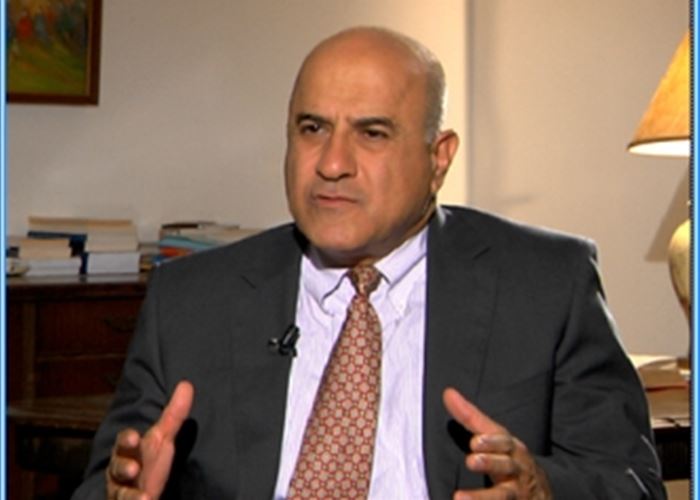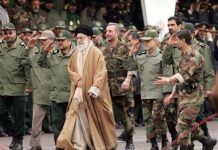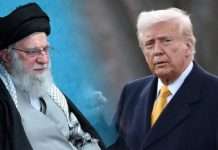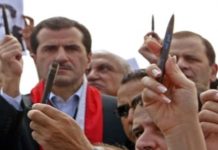لبنان وسوريا الشبكة المعقدة
د. شارل إلياس شرتوني/22 كانون الأول/2024
ترجمة من الإنكليزية بحرية بواسطة الياس بجاني
Lebanon and Syria, the Tangled Web
Dr. Charles Elias Chartouni/December 22, 2024
The political evolutions in both countries are quite ambivalent since they usher in a new political era beset by the pitfalls and the dirty arcanes of domestic and regional power politics. The downfall of Hezbollah and the Assad regime is dawning a new chapter in the life of both Lebanon and Syria, notwithstanding their societal and political idiosyncrasies. The transformative dynamic of the Israeli counteroffensive has elicited unconventional political expectations unknown to the region and questioned the political and military foreclosures that have prevented the reformist and reconciliation narratives from taking over and blunted all undertakings from materializing and initiating alternative courses.
The trite ideological doxas that prevailed were able to survive as long as the ongoing power relationships kept hovering over Arab societies and minds. The projected end of Iranian imperialism and the implosion of the Syrian regime have sounded the eclipse of the ideological mantras (Arabism, Islamism, and Third World outdated rhetorics) that have preempted political and social change from taking its due course in the region. The debacle is far from being restricted to the military realm; it challenges the political scripts and the evidence that have kept this area at bay from the political and societal upheavals caused by the democratic and liberal waves that succeeded the end of the communist dystopia and its geo-strategic and political configurations. One wonders why Arab and Muslim societies were kept aside and why their reformist agendas were systematically obliterated.
The ongoing unraveling of the Iranian power projections, the annihilation of their operational platforms, and the deconstruction of their ideological scheme account largely for the emerging political dynamics and the rise of the reformist political agendas based on democratic and liberalizing political agendas, reasserted national sovereignty, and readiness to engage a conflict resolution course based on moral reciprocity, negotiations, and political accommodation. However critical the current situation is, it opens up new horizons and gives rise to alternative political prospects.
Nonetheless, this looming horizon is still a possibility and a mere longing as long as the imperial agendas of Islamists of whichever stripe and autocratic proclivities are still hobbling political life. The Iranian regime, after losing its ideological and military platforms in Lebanon, Syria, and Gaza, is trying to outmaneuver the transformative dynamics while its faltering credentials and abilities are at their pinnacle. Change is inevitable, and there is no need to dwell on the need for oppositions to seize the rising opportunities to outdo the hypothecations and enforce a new political course.
The defeat of Hezbollah in Lebanon and Syria should lead to its eradication from political life and undermine its strategy to win in politics what it has lost in war. The outcomes of the domination strategy led by Iran throughout the Near East were destructive enough to challenge its status, credentials, and effective stature. The strategy of the integrated military platforms has led to the destruction of two countries (Lebanon and Syria), the Gaza district, Iraq, and Yemen and their transformation into wastelands instrumented by terrorism and organized criminality. The Iranian regime, like al-Qaïda and ISIS, is located along the same ideological and strategic continuum, aside from its specific institutional and political positioning.
Lebanon has no chance of rebuilding itself as long as Shiite fascism is still determined to challenge the consociational and liberal political culture, instrumentalize state institutions, and pursue the sabotaging strategy and the cycles of nihilistic violence. The truce concluded a month ago does not seem to yield positive outcomes insofar as surrendering arsenals, dismantling military infrastructures, and renouncing subversive politics. Its siding with the defunct Syrian regime, attempt at enlisting HTS support, and blatant intent on pursuing the war with Israel are quite indicative of the unwillingness to change the narrative and the political course.
The takeover of the Syrian regime by HTS and its shrouded ambiguities raise legitimate questions in regard to its impending political projections, Islamist imperialism, and ideological hubris. The peaceful takeover and the festive atmosphere of the ongoing process match perfectly with the political statements made by its leader, who distanced himself from ideological pronouncements and emphasized the priority of the national reconciliation and the national convention to decide over the strategic choices that should guide the post-war reconstruction in Syria, the reintegration of the international community, the transitional justice, and the abolition of the sanctions regime.
This declaration of intent is quite reassuring as long as it endures the reality check and validates its premises. The Christmas trees in major Syrian cities are resolutely indicative of the normalization demeanor. Nonetheless, the hazards of transition range between the Islamic radicalism, the Turkish, Qatari, and Saudi power politics; the failure of political dialogue between the ethno-religious great; the resumption of political violence and civil instability; and the breakdown of governance. The takeover seems of good omen and needs to be closely monitored and shepherded since it might lay the foundation of an all-encompassing and long-awaited political, societal, and cultural metamorphosis.
لبنان وسوريا الشبكة المعقدة
د. شارل إلياس شرتوني/22 كانون الأول/2024
ترجمة من الإنكليزية بحرية بواسطة الياس بجاني
إن التطورات السياسية في لبنان وسوريا هي متناقضة للغاية، حيث تشير التطورات إلى حقبة جديدة قد تكون مليئة بالفخاخ والأسرار المؤذية للسياسات الداخلية والإقليمية. هذا فإن سقوط حزب الله ونظام الأسد يفتتح فصلاً جديدًا في حياة كل من البلدين لبنان وسوريا، بالرغم من خصوصياتهما الاجتماعية والسياسية. أما الديناميكيات التحويلية للهجوم المضاد الإسرائيلي أثارت توقعات سياسية غير تقليدية وغير مألوفة في المنطقة، ووضعت تساؤلات حول الإغلاق السياسي والعسكري الذي حال دون سيطرة السرديات الإصلاحية والمصالحة، وتعطيل جميع الجهود لتحقيق تغييرات جوهرية ومسارات بديلة.
إن الأيديولوجيات المبتذلة التي كانت سائدة استمرت فقط طالما بقيت علاقات القوة القائمة على السيطرة على المجتمعات والعقول العربية، والنهاية المتوقعة للإمبريالية الإيرانية وانهيار النظام السوري يشيران إلى زوال الشعارات الأيديولوجية (القومية العربية، الإسلاموية، وخطابات العالم الثالث البالية) التي منعت التغيير السياسي والاجتماعي من أن تأخذ مجراها الطبيعي في المنطقة، وسبب الفشل لا يقتصر على المجال العسكري فقط، بل يطاول النصوص السياسية والحقائق التي أبقت هذه المنطقة بعيدة عن التحولات السياسية والاجتماعية التي أحدثتها الموجات الديمقراطية والليبرالية التي أعقبت انهيار الديستوبيا الشيوعية وترتيباتها الجيوسياسية والسياسية.
السؤال هو لماذا بقيت المجتمعات العربية والإسلامية على الهامش، ولماذا أُجهضت أجنداتها الإصلاحية بشكل منهجي؟ الجواب يكمن بالانهيار الجاري لمشاريع القوة الإيرانية، وتدمير منصاتها العملياتية، وتفكيك مخططاتها الأيديولوجية مما يفسر بدرجة كبيرة الديناميكيات السياسية الناشئة وصعود الأجندات الإصلاحية التي تعتمد على أجندات سياسية ديمقراطية وليبرالية، وإعادة تأكيد السيادة الوطنية، والاستعداد للانخراط في مسار حل النزاعات القائم على التبادلية الأخلاقية والمفاوضات والتسويات السياسية.
وعلى الرغم من خطورة الوضع الحالي، فإنه يفتح آفاقًا جديدة ويعطي فرصًا سياسية بديلة، ومع ذلك يبقى هذا الأفق المحتمل مجرد تطلعات طالما أن الأجندات الإمبريالية للإسلاميين، أيًا كانت توجهاتهم، والنزعات الاستبدادية، لا تزال تعيق الحياة السياسية، كما أن النظام الإيراني، بعد خسارة منصاته الأيديولوجية والعسكرية في لبنان وسوريا وغزة، يحاول المناورة لمواجهة الديناميكيات التحويلية بينما قدراته وأوراقه تتهاوى، ولهذا فإن التغيير حتمي، ولا داعي للاسترسال في الحديث عن ضرورة انتهاز المعارضات للفرص المتاحة لتجاوز العراقيل وفرض مسار سياسي جديد.
إن هزيمة حزب الله في لبنان وسوريا يجب أن تؤدي إلى إزالته من الحياة السياسية وتقويض إستراتيجيته لاستعادة ما خسره في الحرب عبر السياسة، ونتائج إستراتيجية السيطرة التي قادتها إيران في الشرق الأدنى كانت مدمرة بما يكفي لتهديد مكانتها وشرعيتها، علماً أن إستراتيجية المنصات العسكرية المتكاملة أدت إلى تدمير بلدين (لبنان وسوريا) ومناطق غزة والعراق واليمن، وتحويلها إلى أراضٍ قاحلة تستخدم للإرهاب والجريمة المنظمة، ومما لا شك فيه أن النظام الإيراني هو مثل القاعدة وداعش ويقع على نفس الامتداد الأيديولوجي والاستراتيجي، بغض النظر عن تموضعه المؤسسي والسياسي المحدد.
نشير إلى أن لبنان ليس لديه فرصة لإعادة بناء نفسه طالما أن الفاشية الشيعية مصممة على تحدي الثقافة السياسية التوافقية والليبرالية، واستغلال مؤسسات الدولة، ومواصلة إستراتيجية التخريب ودورات العنف العبثي، والهدنة التي تم التوصل إليها قبل شهر لا يبدو أنها تؤدي إلى نتائج إيجابية فيما يتعلق بتسليم الأسلحة، وتفكيك البنى التحتية العسكرية، والتخلي عن السياسات التخريبية. هذا ومن الواضح أن انحياز حزب الله إلى النظام السوري البائد والساقط، ومحاولته استمالة دعم هيئة تحرير الشام، ونيته الواضحة لمواصلة الحرب مع إسرائيل، كلها مؤشرات على عدم رغبته في تغيير السردية والمسار السياسي.
وفي نفس السياق فإن استيلاء هيئة تحرير الشام على النظام السوري وما يحمله من غموض يثير تساؤلات مشروعة حول توقعاته السياسية المقبلة، الإمبريالية الإسلاموية، والغرور الأيديولوجي. إن استيلاء الهيئة السلمي والأجواء الاحتفالية للعملية الجارية يتماشى تمامًا مع التصريحات السياسية التي أدلى بها زعيمها أحمد الشرع (الجولاني)، الذي نأى بنفسه عن التصريحات الأيديولوجية وأكد على أولوية المصالحة الوطنية والاتفاق الوطني لتقرير الخيارات الإستراتيجية التي يجب أن توجه إعادة الإعمار بعد الحرب في سوريا، وإعادة الاندماج في المجتمع الدولي، وتحقيق العدالة الانتقالية، وإلغاء نظام العقوبات.
من الأكيد أن هذا الإعلان عن النوايا للشرع مطمئن طالما أنه يخضع لاختبار الواقع ويؤكد أسسه، في حين أن أشجار الميلاد في المدن السورية الكبرى تشير بشكل حاسم إلى نهج التطبيع، ومع ذلك، فإن مخاطر الانتقال تتراوح بين الراديكالية الإسلامية، والسياسات القطرية والتركية والسعودية، وفشل الحوار السياسي بين المكونات العرقية والدينية الكبرى، واستئناف العنف السياسي وعدم الاستقرار المدني، وانهيار الحوكمة.






















